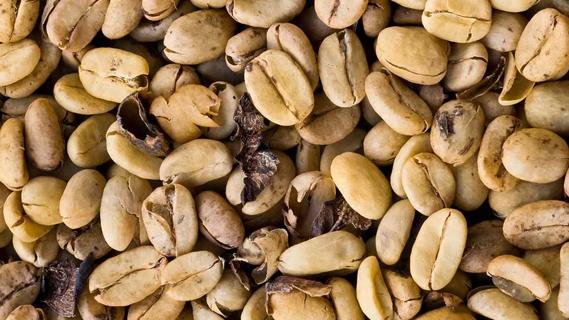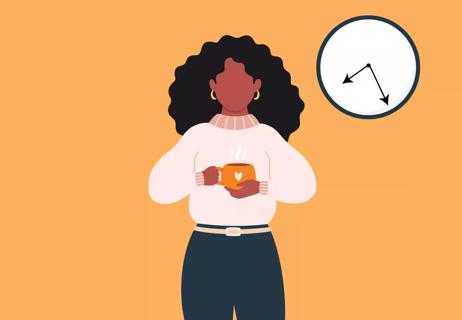This old wives’ tale is just a myth

Did you ever try to score a sip of your parent’s morning coffee when you were a kid? You might’ve gotten your hand batted away and heard the response, “You can’t drink that! It’ll stunt your growth.” But is it true?
Advertisement
Cleveland Clinic is a non-profit academic medical center. Advertising on our site helps support our mission. We do not endorse non-Cleveland Clinic products or services. Policy
“The answer to this one is simple: Caffeine doesn’t impact growth,” says pediatric endocrinologist Roy Kim, MD.
So, while there’s no truth to the myth that caffeine will prevent kids from growing taller, there’s still plenty you should know about the effects of caffeine on children and on what can actually impact their growth. Dr. Kim delves deeper.
As many a latte-lover can anecdotally attest, this old wives’ tale is just that — a myth. There isn’t any scientific medical evidence that coffee, in particular, or caffeine, in general, stunts growth.
“Caffeine does not meaningfully impact how tall a child gets,” Dr. Kim confirms.
And no one seems to be quite sure where this belief originated, though it’s really taken root in our culture throughout the years. Dr. Kim weighs in on two relevant caffeine facts that could be loosely attached to the lore.
Advertisement
Though the U.S. Food and Drug Administration (FDA) doesn’t currently offer official guidelines about children and caffeine, the American Academy of Pediatrics says no amount of caffeine is proven safe for kids.
“For kids, there are a lot of potential health implications of caffeine,” Dr. Kim says. “While we don’t inquire much about caffeine in terms of growth evaluations, it’s part of our evaluation in terms of issues like sleep and attention problems.”
It can cause:
There’s another health concern when it comes to caffeinated drinks, too: “Soda and energy drinks often come loaded with sugar, so their consumption is directly tied to an increase in body weight and obesity,” Dr. Kim warns.
“In my field, we see kids with all kinds of growth disorders, and caffeine is never a factor,” Dr. Kim assures. But if coffee doesn’t play a role in how tall you grow, what does?
“For children who are growing, other factors are all more important in determining growth.” He walks you through some of those key factors.
Got a tall family? You’re likely going to be tall, too. Genetics is the single most powerful influence in how tall children are likely to grow.
“Biological parents’ heights strongly determine what’s regarded as normal height for children when they reach adulthood,” Dr. Kim says. The height of your biological grandparents, aunts and uncles can also help clue you in to how tall you or your child will probably be.
In short, calorie deficits stunt growth. In fact, studies show that babies born into households at risk of poverty are likely to be smaller in stature.
“At a very basic level, you just have enough calories,” Dr. Kim says. “More and more, this is a real issue for people in our own communities and around the world — just to be able to access enough food.”
It’s not just about calories; it’s also about the right distribution of nutrients. Good nutrition is one of the keys to healthy child development, including physical growth.
“Carbohydrates, protein and healthy fats are the building blocks used to fuel and build up our bodies, and they’re all important for normal childhood growth,” Dr. Kim says.
Calcium, vitamin D, vitamin C and more all play a key role in how cells grow and how tissue is built. If kids aren’t getting the right amounts or are severely deficient in particular vitamins and micronutrients, their growth may be impacted.
Advertisement
“A general multivitamin is never a bad idea,” Dr. Kim says, especially if your kiddo is a picky eater.
Sometimes, a kid can have tall parents and a great diet but still not be growing as expected. Hormone deficiencies and other issues can cause growth disorders, even without a family history of them.
“That’s one of the reasons why it’s important for growing kids to have an annual wellness visit,” Dr. Kim says. “The primary care provider will notice that on the growth chart, it can do some testing or needed referrals.”
“Severe deprivation of love and affection can adversely affect childhood growth,” Dr. Kim says. So in addition to healthy foods, a healthy emotional environment is important for kids to grow to their full potential — physically and emotionally.
Advertisement
Learn more about our editorial process.
Advertisement

The caffeine and natural acids in coffee may trigger acid reflux, but there are ways to lessen the effects

Along with boosting your energy, a moderate amount of coffee can help lower your risk of Type 2 diabetes, liver disease and certain cancers

That cup of joe may help decrease inflammation and remove damaged cells in the vital organ

Coffee is made up of mostly water, but it’s the caffeine you have to look out for

There’s no evidence to prove this supplement can help with weight loss, and it may come with risks

Morning, noon or night — the best time for that cup of joe depends on you

Depending on your sensitivity to caffeine, a late-night cup may be just fine

It’s fine for most, but it can worsen heartburn and ulcers if you’re prone to them

The tropical fruit is a good source of antioxidants and vitamin C

Most people fall asleep within 10 to 20 minutes, but if your experience is different, adjusting your sleep schedule may help

Exploring your hidden side can lead to better understanding of what makes you tick